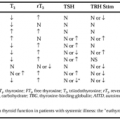APPETITE
Angelica Lindén Hirschberg
Appetite is the sensation of hunger or desire for specific food. The behavioral response to this sensation is food intake, which eventually leads to satiety. Many factors are involved in the regulation of appetite, both on a meal-to-meal basis and longer term. The mechanisms consist of peripheral factors from the gastrointestinal tract that signal satiety when the stomach is full and hormones (secreted in proportion to body adipose tissue mass) that provide feedback information on body fat stores. These peripheral signals reach the brain and act on central effectors that either reduce food intake and promote weight loss or stimulate food intake and promote weight gain. The overall purpose of all appetite-regulating mechanisms is to adjust food intake so that caloric intake balances energy expenditure, with the result that body weight is maintained at a certain setpoint. The hypothalamus has a key function in the central mechanisms of appetite and body weight regulation.






